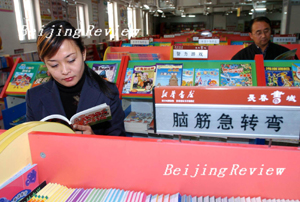
A major step was made in June 2004 when 13 enterprises and public institutions, formally under Guangdong Provincial Bureau of Press and Publication, and state shares of the Guangdong Xinhua Distribution Group, were incorporated into the Guangdong Provincial Publishing Group. Before long, the group was transformed into a wholly state-owned enterprise and was granted the right to manage state assets, removing the structural barriers to creating equal market players.
Chen Junnian, Director of the Guangdong Provincial Bureau of Press and Publication, noted that after the transformation, Guangdong Provincial Publishing Group would run their business as an independent market player, while the bureau, as a government branch, would lawfully regulate, supervise and offer public service for this industry.
Huang Shangli, Chairman of the Guangdong Provincial Publishing Group, predicted that his group’s sales revenue of 2004 would have reached 2.4 billion yuan ($289.9 million), with profits surpassing 200 million yuan ($24.2 million). According to Huang, annual publications of his company have topped 4,500 titles, and the titles of audio-visual publications have surpassed 450, laying a solid foundation for further development.
Enthusiastic Private Players
In the Chinese book market, slumbering in stagnation for some time, the saving grace has been sales of textbooks and other educational materials. Covering a market share of 71 percent, these books hold great potential for growth, seducing many private book firms into making them their first catalogue of books.
According to Mao Wenfeng, General Manager of Keyi Industrial Co. Ltd., a private publication firm based in east China’s Jiangsu Province, Chinese private book firms could be divided into two groups. Some are book wholesalers engaged in wholesale distribution, while the others are cultural companies and workshops engaged in conceptualizing and writing books. Private book firms, once nicknamed “the second channel” and long seen as the Cinderella of the publishing industry, have taken center stage under the new publishing regulations that loosen the control over the private sector.
Flexible and quick response to the market has made private publication companies big winners in the market of supportive educational books. Some best sellers have achieved nationwide popularity and become household names.
A group of private book firms have thus become successful and several of them, with Keyi private publishing firm as their representative, have become quite successful.
In recent years, the development of the Chinese publishing industry has attracted more and more international attention. Last October, the Frankfurt Book Fair, the world’s largest trade fair for books, sponsored a Chinese private book company to participate in this fair for the first time, which reflects the strong interest in China’s private book industry.
As a consistent supporter of independent publishers, the organizer of the Frankfurt Book Fair sponsors a small but dynamic independent publisher from a developing country to network with the international publishing industry at the fair every year. The faith shown in the development of China’s private book companies illustrates the successful publishing operation and marketing efforts now being made in China.
| 